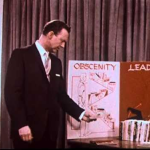I got started on the Internet in the early 1990s, when every session was preceded by the squeal of an acoustic modem over a phone line, and USENET was the cutting edge of interaction. I loved it. USENET was a decentralized, public system that didn’t really have an owner or a central control. The USENET group alt.sex.bondage was a major influence on my budding interest in BDSM. The Internet seemed like a wide-open utopia/frontier of freedom and choice, where I could find like-minded people.
I knew that there were racists, sexists, homophobes, anti-Semites, etc out there, spewing out their hatred, but also assumed these were sad little men in small dark rooms who didn’t pose a serious threat to anybody. (Being a white, cis, hetero male was definitely part of this assumption.) Child pornography was, I read, a bogeyman for people who wanted to censor for the sake of censoring. Free speech was an almost unequivocal good.
Fast forward more than twenty years, past high-speed internet, Youtube, Facebook, Google, Gamergate, Sad/Rabid Puppies, 4chan, ironic racism, pick up artists, MGTOWs, incels, revenge porn, etc. Those sad little men networked and became a force that has dragged North American society hard to the right. This also coincided with a terrifying rise in right wing demonstrations and violence.
As of the end of 2018, there has been at least some pushback against the alt-right. People who have committed hate crimes have been prosecuted under the law. Media figures like Alex Jones, Milo Yiannopolis and Gavin McInnes have been kicked off major platforms like Youtube and Twitter and barred from venues, a tactic known as “de-platforming”.
I was never 100% comfortable with the concept of de-platforming, which to me had an unpleasantly Newspeak overtone. “It’s not censorship, it’s de-platforming.” But I’ll be honest and say that, despite my commitment to free speech, I wasn’t going to go to the barricades for the likes of McInnes, Jones and Yiannopolis.

One of the big takeaways from Slavoj Zizek’s two films explaining his theory of ideology (The Pervert’s Guide to Cinema and The Pervert’s Guide to Ideology) is that ideologies don’t require all of their followers to have sincere belief. A successful ideology can accommodate people who know how to toe the party line, say the phrases, wear the uniform, and smugly congratulate themselves on being ahead of the game, all the while contributing to the machine. Whether they were true believers or hucksters/trolls, the end result was the same: an endless flood of hatred, paranoia and self-righteousness, into the eyes and ears of people who had a limitless appetite for it. Likewise, it doesn’t matter if the recipients are hardcore white supremacists or misogynists or anti-Semites, or they just get off on the transgression, they’re still propagating it. The best way to curtail such people is to attack them where it hurts: their bottom lines.
That’s why I didn’t object to the de-platforming very much: because North America and Europe are seething with racial, gendered and religious violence, and I didn’t know what else to do about it. Something had to be done to reign it in. Even if you don’t believe in the “monkey-see-monkey-do” model of the media’s influence on the individual’s actions, such tactics at least sent a message regarding what was acceptable discourse. If that had even a slight chance of preventing another Pulse nightclub shooting or Toronto van attack, go for it.

The idea that media creates and propagates a culture, and certain percentage of recipients of that media will do physical violence, is straight out of the second-wave radical feminist arguments against pornography and sadomasochism. Which puts me in a bit of a bind.
The changes in content rules on Tumblr (coming into effect December 17, 2018) and Facebook (soon) are driven by the “anti-trafficking” ideology that gave use SESTA/FOSTA. Going into the history and flaws of that legislation would require an in-depth article itself, but they’ve already caused problems for sex workers, and people who discuss sexual issues.
Personally, these changes will cause problems for me. As of December 15th, 2018, I have 2,790 followers on Tumblr, 223 followers on the Facebook group and 233 followers on Pinterest, and no way to transfer them to other platforms. They are major assets for promoting A Lover’s Pinch and other future projects. I especially liked how I could set up automatic daily updates on Tumblr and then have them repeated on Twitter via IFTT. While I was never a huge user of Tumblr, especially not for personal material, I liked scrolling through feeds and reading the freewheeling, queer and quirky stuff. I know it had its own problems with hateful content. I read the “raceplay” tag a few times and, as I read, I kept thinking, “You’re just kidding, right? This is all just rhetorical?”
It’s not a good look to shrug when other people are de-platformed with “Well, they had it coming,” and then cry when it happens to me.
The philosopher Karl Popper wrote about the “paradox of tolerance” in 1945, right after seeing the global violence of fascism.

In other words, we have to draw the line somewhere. But where? I know where I would draw it, but that’s a solution only for me.
I could pile up the word count hashing out this debate, but the real problem is that this is an issue outside of politics. Tumblr, Facebook, etc, are private corporations. They exist to benefit their shareholders, and any other benefits are only incidental. Thus, they can impose whatever content regulations they like. Whatever communities users may have built on those platforms, they never belonged to their users. The real problem is the influence of capital on our discourse, at multiple levels.
One of the things that suck about getting older is that you have to see the revolution you believed in falter and be assimilated or even corrupted. The online communities of hatred (of women, non-whites, queer people, trans people, Jews, Muslims, immigrants, and so on) (and their parasitic profiteers) festering on the Internet in 2018 are a twisted, degraded reflection of the communities of acceptance and diversity that flourished on the Internet of 1998. (Please make allowances for rose-coloured glasses of nostalgia.) The Internet was supposed to be a path to utopia.
I don’t know what will happen to my blog on Tumblr Monday, or what will happen on other platforms in the years to come. Will there be some kind of cultural conservative backlash, a return to the middle after the excesses of the extremes? That bodes ill, not just for online communites, but for society in general.



